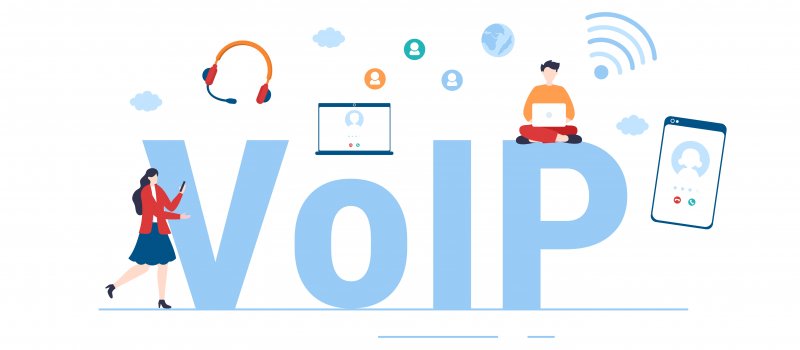As our reliance on phones continues to grow, particularly in the digital age, a notable shift is occurring – on-premises phones, once ubiquitous both in professional settings and homes, are gradually giving way to the exclusive use of smartphones. But now, a growing number of people are becoming “smartphone-dependent,” with 15% of American adults abandoning home broadband to only use mobile devices.
As a business owner, you might wonder if you could do something similar with your company’s setup. At the same time, there is growing hype around VoIP phones as the most practical business solution that offers the best of both worlds.
Should you take the plunge into the growing VoIP landscape? Discover everything you need to know about VoIP phones and how to make them work for your team.

Key Takeaways:
- VoIP phones make calls over the internet instead of landlines.
- VoIP phone systems have more advanced features than traditional phone services and allow you to manage hybrid and remote work teams.
- You can easily switch from an old private branch exchange or landline system to a VoIP service with Intermedia’s help.
What Is VoIP, and What Are VoIP Phones?
VoIP is an acronym for “Voice over Internet Protocol.” This technology enables voice calls over the internet by converting audio data into a compact digital format. That message can then travel instantaneously across the web to the receiver.
You might have used VoIP phones and not even know it. A VoIP phone is any piece of equipment that can make calls over the internet. As a result, modern smartphones are capable of using VoIP, as are desktop computers, laptops, and tablets.
However, the term “VoIP phone” often specifically refers to a device that is primarily for such calls over the internet. The equipment connects through an Ethernet cable or Wi-FI for the highest-quality audio experience. Other names for VoIP phones include internet phones, IP phones, and SIP phones.
How Are VoIP Phone Services Different Than Traditional Phone Systems?
VoIP phones are much more powerful than traditional landline phones on analog private branch exchanges. Because VoIP is a web-based service, you can also access advanced digital communications features at a low cost.
Setting up an analog phone line takes lots of time and requires technicians to build or modify your system. That means you have a high upfront expense and aren’t getting a financial return on your system in the meantime.
Also, workers can use business VoIP phones anywhere they can connect securely to the internet. Therefore, you have a location-agnostic PBX system for maximum flexibility.
With traditional phones, you can only use your internal business lines in locations where you’ve set up the system. You might be able to use a forwarding service, but this is another costly expense and not nearly as convenient as a VoIP phone system.
What Is the Difference Between a Hard Phone and a Softphone?
You’ll hear the terms “hard phone” and “softphone” when discussing VoIP systems and should know how they differ.
Hard Phones
A hard phone refers to a dedicated device that connects to the internet solely for your business line. The equipment resembles standard analog office phones.
Hard phones can ensure excellent call quality because they’re devices that are only for your company’s communications. Hard VoIP phones can also be easier to use for your team members because you can usually just plug in the device and start using it without downloading software.
Hard phones are also ideal if you have a strict device policy to keep team members off of their personal phones. If you worry about employees engaging in time-wasting activities or want extra communications security, a hard phone may be the right choice.

Softphones
A softphone refers to the software on a device that enables phone calling and other communications, such as texting and email. An excellent example is Intermedia Unite’s desktop and mobile apps.
With softphones, you don’t need to purchase any additional equipment to start using your business phone line. You can implement a bring-your-own-device policy so that team members can use their own phones on your system.
The key thing with soft VoIP phones is that the software still allows you to retain a high level of security and protect your internal communications. Also, you retain ownership of those communications and can monitor and archive all discussions on the platform.
Which Are the Best VoIP Phones on the Market?
If you’re thinking of acquiring VoIP phones and accessories for your team, you can find quality devices from various retailers. However, here are our picks for the top devices available:
- Best desk phone — Yealink T57: This plug-and-play device supports 16 lines and has a bright 7-inch LCD touchscreen. Built-in Wi-Fi and Bluetooth make it easy to use anywhere.
- Best headset — Poly Savi 8220: This is a premium headset for complete freedom to roam around the office with stereo sound and noise cancellation. Its 13 hours of talk time ensures you won’t lose functionality in the middle of a call, and three-way connectivity lets you switch seamlessly between soft and hard VoIP phones.
- Best analog phone adapter — Grandstream HT801: This adapter turns traditional phones into VoIP-enabled devices. It’s a compact solution for high-quality calls.
- Best conferencing phone — Yealink CP965: This is a touch-sensitive conference phone that works well in large rooms. The device has 13 microphones and picks up voices from 20 feet away.

You can find these devices and other excellent VoIP phones and accessories from Intermedia when you’re ready to install your unified communications system.
Reach Out to Intermedia for Help Setting Up VoIP Phones
If you want to access the benefits that VoIP phones can deliver for your business, talk to our team at Intermedia. We’ll help you find the right VoIP plan and phones for your organization.
January 26, 2024
Explore other posts on these topics: Unified Communications





